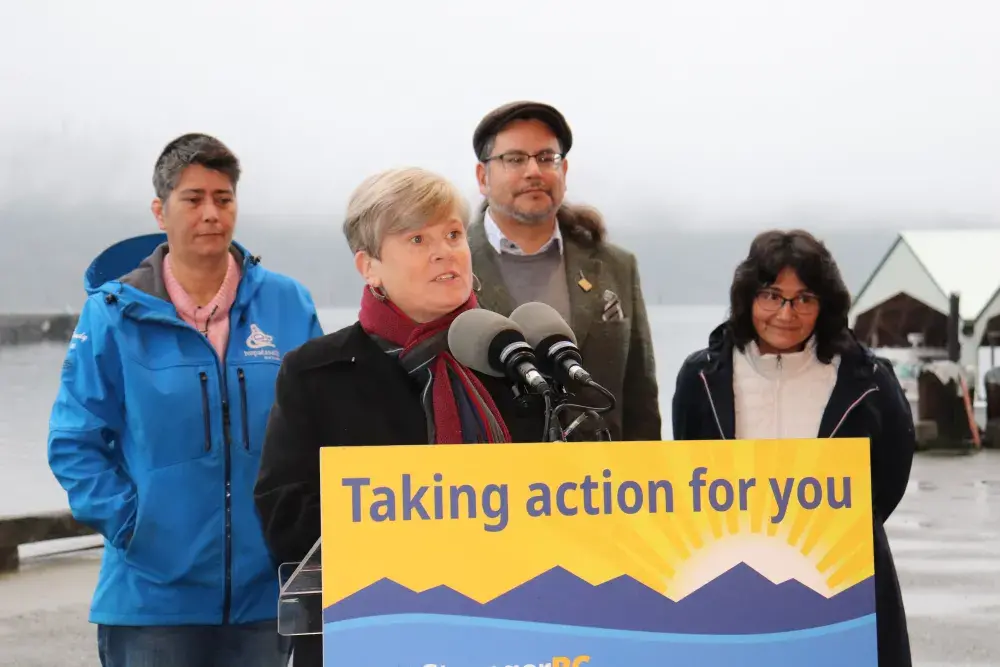Josie Osborne, B.C.’s newly appointed minister of Health, was in Port Alberni Dec. 19 to make an announcement about the newly expanded Travel Assistance Program (TAP), which helps residents in remote communities travelling for non-emergency medical specialist appointments.
Changes to improve the TAP include free ferry service for residents of rural, remote and First Nations communities travelling for non-emergency appointments.
TAP is a corporate partnership between the Ministry of Health and private transportation carriers. The new expansion to the province’s TAP now includes coverage for privately managed boat routes so that rural residents can have better access to non-emergency medical services.
According to the Ministry of Health, TAP supports patients with the cost of travel when they need to use ground, air, or boats to access non-emergency medical services not available in their home communities.
First Nations people living on reserve usually receive support for patient travel through their administration office. The First Nations Health Authority administers Medical Travel benefits to help reduce the financial burden of travelling for medical care for people living in remote communities and to improve health equity.
FNHA Medical Travel may include support to cover the cost of travel, accommodation, meals and, in appropriate cases, an escort.
The free ferry service through TAP complements medical transportation benefits available through the FNHA.
The new expansion could benefit those that travel for non-emergency medical reasons on these ferry routes, serviced by independent contractors in Nuu-chah-nulth communities. Beginning Dec. 19, 2024, seven additional ferry routes are being added to TAP. Applicable routes include:
* Tahsis and Kyuquot to Gold River
* Bamfield, Kildonan and Haggard's Cove to Port Alberni
* Ahousaht and Hot Springs Cove to Tofino
Osborne, accompanied by elected Nuu-chah-nulth leaders John Jack and Brandy Lauder of the Huu-ay-aht and Hupacasath First Nations, made the announcement at Port Alberni’s Lady Rose Marine office, where travelers can book sailings aboard the MV Lady Rose to go to Kildonan or Bamfield.
She said 22 First Nations communities in the province would be supported by the changes to TAP.
“It’s important for all people of remote communities – when access to health care improves, outcomes are better and people live longer,” said ACRD Chair and Huu-ay-aht Chief Councillor John Jack.
TAP eligible medical specialist services include: non-emergency medical specialist services available at the closest location outside the patient's community, diagnostic procedures, laboratory procedures, diagnostic radiology, nuclear medicine procedures, the B.C. Cancer Agency, transplant units, HIV/AIDS treatment at St. Paul's Hospital, specialty clinics at BC Children's Hospital and other tertiary care hospital services.
According to FNHA, registered Indigenous Canadians receive patient travel support through their First Nations Health Benefits, via the Medical Transportation (MT) Benefit.
“Health Benefits works with First Nations communities to deliver the MT Benefit. Community Patient Travel Clerks or First Nations Health Authority (FNHA) Assessors are your connections to help you access your MT Benefit,” FNHA states on their website.
But, as residents of isolated communities know, it can be difficult, expensive, and sometimes even impossible to travel some rural routes that could mean logging roads that flood or wash out, or from the island communities not served by BC Ferries.
"Although travel on BC Ferries has long been covered for people through TAP, expanding coverage to privately managed ferry routes means more people living in rural, remote and First Nations communities will benefit from much-needed help with their travel costs," said Osborne.
"Access to quality health care shouldn't depend on where in B.C. you choose to live," said Debra Toporowski, parliamentary secretary for rural health. "By making TAP available to people living in these ferry-dependent communities, we're not only reducing financial strain for people who have to travel outside their community for care. We're also making health-care access more equitable and ensuring that people in rural and remote communities don't get left behind."
Expanding TAP is part of the province's work to improve health equity for people living in rural and remote communities and builds on investments in medical travel and accommodation support through the Canadian Cancer Society and Hope Air.
TAP does not provide direct financial assistance to patients for travel costs or make travel arrangements for patients. Meals, accommodation, mileage, fuel and local transportation expenses are not included in TAP and are the responsibility of the patient.
There is no reimbursement for travel already taken.
To be eligible for TAP as a patient:
- you must be a B.C. resident and be enrolled in the Medical Services Plan (MSP);
- you must have a referral from a physician or nurse practitioner for MSP insured specialist medical services which are not available locally;
- your travel expenses must not be covered by third party insurance, such as an employer plan, extended medical plan, the Insurance Corporation of BC, WorkSafeBC or a federal government program (e.g. Veterans' Affairs).
If you are a First Nations Resident travelling for non-emergency medical specialist services, you may also be eligible for benefits through the First Nations Health Authority.

